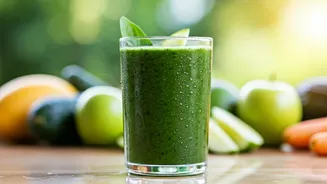Importance of Kidney Care
The kidneys are vital organs responsible for filtering waste and toxins from the blood. They also play a crucial role in regulating blood pressure, producing
hormones, and maintaining a healthy balance of fluids and electrolytes. When kidneys aren't functioning optimally, it can lead to a buildup of harmful substances in the body, which can cause serious health problems. Therefore, incorporating kidney-friendly practices into your daily life is essential. This includes staying hydrated, following a balanced diet, and making mindful choices about what you consume. Regular check-ups and early detection of any issues are also critical for maintaining kidney health, preventing potential complications, and promoting overall well-being.
Water: The Hydration Powerhouse
Water is the cornerstone of kidney health. Adequate hydration is crucial because it helps the kidneys flush out waste products effectively. Drinking enough water supports kidney function and helps prevent the formation of kidney stones. The amount of water needed varies from person to person, but aiming for at least eight glasses of water per day is a good starting point. Dehydration can strain the kidneys, making them work harder and potentially leading to damage over time. To ensure you're adequately hydrated, pay attention to your thirst cues, and make water easily accessible throughout the day. You can also add slices of lemon or cucumber to your water for added flavor and benefits.
Cranberry Juice: Urinary Ally
Cranberry juice is often recommended for its potential benefits in supporting urinary tract health, which in turn benefits the kidneys. The antioxidants in cranberries can help prevent bacteria from adhering to the urinary tract walls, potentially reducing the risk of urinary tract infections (UTIs). UTIs, if left untreated, can lead to kidney infections. However, be cautious: not all cranberry juice is created equal. Look for unsweetened cranberry juice, as the added sugars in many commercial products can be detrimental to overall health. Drinking a moderate amount of unsweetened cranberry juice can be a helpful addition to your kidney-friendly diet and lifestyle, but it should not be considered a substitute for medical treatment if you suspect a UTI.
Beet Juice: Antioxidant Boost
Beet juice is another beneficial drink, packed with antioxidants and nutrients that can support kidney function. Beetroot contains compounds that may help reduce inflammation and protect against oxidative stress, both of which can impact kidney health. Additionally, beets are rich in nitrates, which can help improve blood flow. Good blood flow is crucial for kidney health. While beet juice can be a nutritious addition to your diet, it's essential to consume it in moderation. The high oxalate content in beets might cause problems for some people. If you have a history of kidney stones, it's wise to consult with a healthcare professional before incorporating large amounts of beet juice into your diet.
Lemon Juice: Cleansing Properties
Lemon juice, when added to water, can offer several benefits for kidney health. Citric acid, found in lemons, can help prevent the formation of calcium oxalate kidney stones, the most common type of kidney stone. The mild acidity of lemon juice helps to alkalize the urine, which can also reduce the risk of stone formation. Drinking lemon water throughout the day is a simple and effective way to support kidney health. Not only does it help you stay hydrated, but it also provides a source of vitamin C and antioxidants. It is important to note that the use of lemon juice should be in moderation. Drinking too much lemon juice can lead to issues with tooth enamel due to the acidity.
Dandelion Tea: Natural Diuretic
Dandelion tea has long been used as a natural diuretic, meaning it helps the kidneys eliminate excess water and sodium from the body. This can be beneficial for those with kidney problems. Dandelion also provides antioxidants and nutrients that support overall health. However, it's essential to use dandelion tea with caution and consult a healthcare provider, especially if you take medications that affect kidney function or blood pressure. While dandelion tea is generally considered safe for most people, excessive use could potentially lead to electrolyte imbalances. Starting with a moderate amount and monitoring your body's response is essential before making it a regular part of your routine. Always prioritize professional medical advice when using herbal remedies.
















